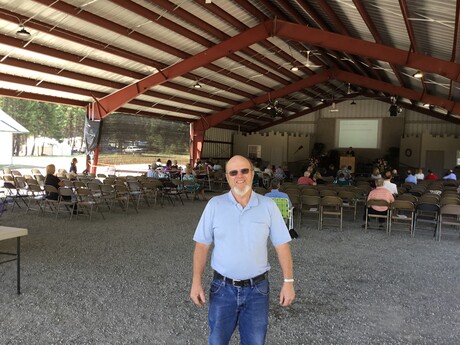Does the early church’s method of evangelism really work in the progressive, postmodern, liberal culture of today? Does publicly preaching our message really contribute to the growth and strengthening of our church in a post-Christian world, or is it nothing more than an exercise in futility to prove our propositional truths?
Think back for a moment to the apostolic church represented by Ephesus in the opening scenes of the book of Revelation. Here was a church, a movement, motivated by and unashamed of the preaching of the gospel that Jesus Christ had commissioned them with. Make note of Peter at Pentecost who “… standing up with the eleven, lifted his voice, and said unto them '… hearken to my words'” (Acts 2:14). The result of this public effort speaks for itself: “Now when they heard this, they were cut to the heart, and said to Peter and the rest of the apostles, 'Men and brethren, what shall we do?'”
The Apostles and Their Culture
Here is an amazing paradox! The Apostles were sharing this public proclamation of the gospel in a culture that was steeped in Roman polytheism and infused with Greek mythology. Despite this, the “foolishness” of preaching resulted in an amazing number of souls being baptized. In what we would call a “postmodern,” progressive culture today, this public method of evangelism was patently effective.
The follow-up to this campaign is worthy of note. The Apostles believed that evangelism was not an event, but a process that needed to provide a healthy and conducive atmosphere for new converts to grow in faith. “And they continued steadfastly in the apostles’ doctrine and fellowship, in the breaking of bread, and in prayers,” according to Acts 2:42.
The leadership of the church understood the importance of nurturing these souls in the doctrine and fellowship that Christ had entrusted to them. Fellowship, as Ellen White describes, is defined by “participation” and “partnership” (Gospel Workers, p. 392). Their commitment to Christ included a pledge of partnership with the church in the "faith once delivered unto the saints” (Jude 3). "Continuing in the doctrine" was also another vital part of growing in grace. We can never say enough about the love of God in giving His Son to die in our place upon the cross, yet conversely we cannot neglect doctrine. The former doesn’t invalidate or undermine the latter.
Today's Questionable Indifference
It’s unfortunate to see articles and sermons presented that give an obvious disdain for the method God has clearly ordained to reach and nurture the masses as characterized by the apostolic church and late advent movement. In Acts 17:6, the response was “these who have turned the world upside down” and eventually brought the world to recognize the power of the gospel through the “foolishness of preaching.” Today, the Seventh-day Adventist Church is nearly 19 million strong. One thing is clear, the success of the early pioneers and later generations of our movement have not been attained by abandoning the apostolic method of evangelism and retreating to a less aggressive approach because of societal changes.
Why is there such indifference to the method that has brought success despite the ever-shifting sands of social and culture values of centuries past? Let’s take a closer look at the cause and effect of preaching the message God gave the early church. In Acts 4:2, the disciples, who had taught and preached to the people, received “many of those who heard the word believed; and the number of the men came to be about five thousand” (Acts 4:4).
In light of history, the fact that we see a growing disdain in some circles for traditional public evangelism and the proclamation of our special message for this time shouldn’t surprise us. It existed in the early church, and we are told it will continue until Jesus comes the second time.
Christ at the Center of Doctrine
The early pioneers of the Advent movement were dealing with the same issue when great and important prophetic developments were taking place. It was because of this Ellen White stated, "The present truth, the special message given to our world, even the third angel’s message, comprehends a vast field, containing heavenly treasures. No one can be excusable who says, 'I will no longer have anything to do with these special messages; I will preach Christ.' No one can preach Christ, and present the truth as it is in Jesus, unless he presents the truths that are to come before the people at the present time, when such important developments are taking place” (Manuscript 33, 1897).
What a sobering thought! The fact that Jesus Christ should be the center in the proclamation of the Three Angels' Messages will give the final gospel call power to move the masses to decision. We are further told in Gospel Workers (p. 156), “Of all professing Christians, Seventh-day Adventists should be foremost in uplifting Christ before the world. The proclamation of the third angel’s message call for the presentation of the Sabbath truth. This truth, with others included in the message, is to be proclaimed; but the great center of attraction, Christ Jesus, must not be left out.”
Notice the work that involves lifting Jesus Christ before the world does not in any sense dismiss the foundational truths of the Third Angel’s Message. On the contrary, they are to be united together to flood the world with the light of the everlasting gospel.
As we see the fruit of active churches bringing the good news to their communities, I believe every pulpit should be ringing with beautiful truths of the blessed hope and soon return of our Lord and Savior Jesus Christ! Let us not draw back as do others, but let us move forward with greater energy and perseverance “making full proof of the ministry” to reaching and saving the lost. The gift of evangelism, along with many other valuable avenues of ministry, has been employed by the Holy Spirit through the church, each unique and distinct, yet essential to working in unison together to bring the greatest potential impact to a dying world that is in desperate need of a Savior. We can hasten the coming of our Lord as we employ every gift God has given for this purpose, never fearing one moment for the future, “unless we forget the way the Lord has led in the past.”
Editor's Note: As space allows, the Gleaner provides the You Said It section for Northwest Adventist members to share their personal testimonies or inspirational thoughts. The views expressed are those of the writer and may not fully reflect those of the North Pacific Union Conference or its leadership. We welcome submissions of 500–900 words for You Said It.










